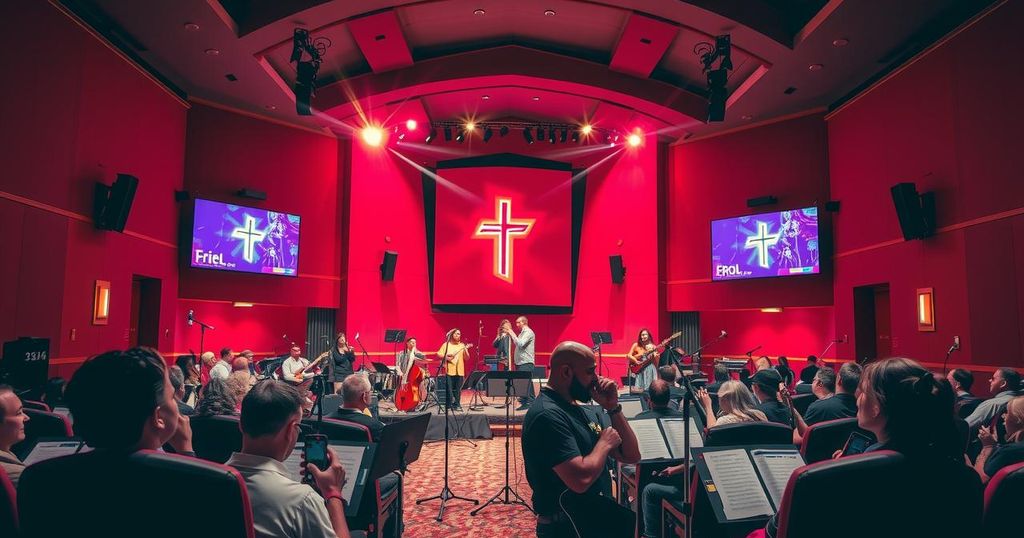Why Some Evangelicals Support Trump: Insights from a Raleigh Pastor
- Pastor Chad Harvey discusses the limited role of politics in his Raleigh congregation.
- Evangelicals are often viewed as politically driven, yet their focus remains on daily life’s struggles.
- Support for Trump is more about political issues rather than personal flaws.
- Harvey emphasises that Evangelicals seek platforms aligned with their understanding of Scripture.
- Misunderstandings about Christian nationalism overshadow the peaceful aspirations of many Evangelicals.
Evangelicals and Their Political Views
The Role of Politics in the Church
Understanding Support for Trump
In Raleigh, North Carolina, a rather fascinating scene unfolded one late October evening at the Cross Assembly Church. Picture a vast auditorium glowing in the dim light, filled with energetic music that had everybody’s heart pumping. Pastor Chad Harvey, who leads this sizeable Pentecostal congregation, regularly draws about 3,000 people each week, yet he insists that political discussions hardly dominate their life together. Surprisingly, he estimates that only about one to two percent of his pastoral conversations touch on political matters, as most congregants seem more concerned with the mundane aspects of daily living—making ends meet, caring for families, and trying to get through their week. Harvey articulates it clearly: “The church isn’t becoming more political—politics is infringing on spiritual territory”. He points to how issues like family and human sexuality that traditionally fell within the church’s jurisdiction are now entangled with political agendas. It’s a change the pastor has observed, one that’s developed over time as religious beliefs increasingly intersect with the political landscape—something that’s happening all over the country, not just in North Carolina. As the conversation shifts, you can sense a genuine intrigue from Detrow, who’s looking to untangle this complex relationship between Trump and Evangelicals. Many perceive Trump as an unlikely figure for such steadfast support, yet for Harvey and many like him, it’s about much more than the personas on the stage. Instead, it’s the political platform that matters, despite the personal flaws of those who espouse them.
Misunderstandings in the Larger Picture
Harvey takes a moment to explain the conundrum many find difficult to grasp—why would Christians rally behind a figure like Trump, infamous for his brash remarks and controversies? He leans in, emphasising that it’s about recognising the imperfections shared among all political figures. “Look,” Harvey says, “we’re all messed up people. Trump is flawed. So are others. But it’s the issues at hand that keep people aligned with him.” Thus, it seems the appeal for many Evangelicals lies in the fact that Trump’s policies align more closely with their understanding of Scripture compared to other candidates. Addressing concerns around accountability, Harvey admits that while he believes there’s a line that can be crossed, it’s critical to hold everyone to the same standards. If a certain candidate is deemed unacceptable—whether it’s one who has been accused of wrongdoing or who has a checkered past—he insists that those standards should apply uniformly across the board. “I’m not saying support a candidate solely based on personal merit,” Harvey insists, “but focus on the platform instead.” As the conversation weaves deeper, Detrow broaches the subject of Lieutenant Governor Mark Robinson—who’s stirred some interest among the congregation due to his unique approach and charming manner. Harvey acknowledges that Robinson speaks everyone’s language, and, while not seeking to brand him a spiritual leader, emphasises that his values resonate well with their biblical perspectives. It’s fascinating because many might assume that figures like Robinson are the embodiment of evangelical leadership, yet Harvey maintains a thoughtful distance, highlighting the necessity to differentiate between spiritual guidance and political affiliation.
Reflections on Community Values
The pastor reflects on perceptions surrounding the Evangelical community and argues that many misconceptions stem from the media portrayal and the oversimplification of their values. “There’s this buzzword—Christian nationalism—that has popped up more recently,” he says, revealing his critical stance on how this narrative misrepresents the actual beliefs of many. For him and the community he leads, it’s less about a devoted mission to enforce Christian tenets onto the country and more about simply living a peaceful life as per biblical encouragement. Harvey explains that what motivates them isn’t about making America a Christian nation but focuses on sharing the good news and fostering community—all while not getting too tangled up in political disputes. In the grand scheme of things, Harvey’s remarks serve as a reminder that sometimes, the narratives surrounding faith and politics can feel more like a whirlwind than a multitude of thoughtful discussions. Rather than seeking to engage in power struggles, many want to live out their faith with tranquility and integrity, proving that there is much more beneath the surface of Evangelical life than the headlines suggest.
Pastor Chad Harvey offers insightful reflections on the complex relationship between his congregation and politics, particularly regarding support for Donald Trump. While political discussions occupy a surprisingly small space in their church life, the political climate has increasingly intertwined with their spiritual matters. Ultimately, for many, the alignment of values with candidates like Trump outweighs personal flaws, fostering a sense of belonging and shared purpose that goes beyond politics. As congregants, they reflect a desire for peaceful lives grounded in faith rather than the contentious narratives that often dominate public discourse.




